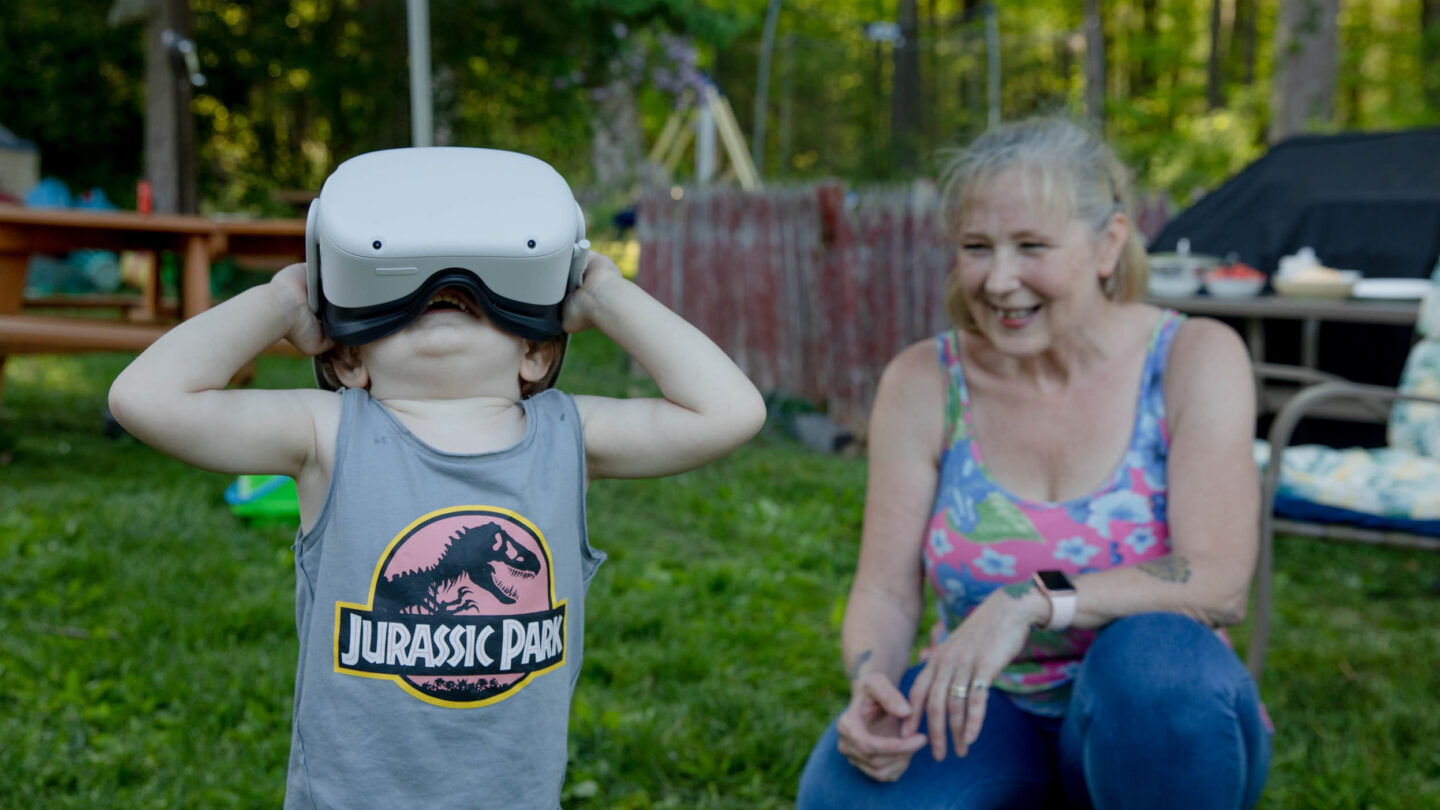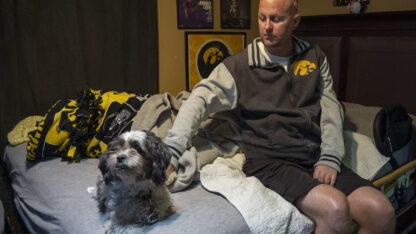At the height of the pandemic, when going to the gym wasn’t an option, millions of people began exploring virtual workouts from home for the first time. And many of them now say they won’t go back.
While this is clearly a boon for the companies developing these systems, it has also helped people who don’t feel comfortable in a gym or don’t have time to get there.
Linda Munson, 56, who lives in Berlin, Conn., has worked a desk job from home since the initial COVID shutdown in 2020. “I was packing on the pounds,” she admits.
Munson’s never been much of a gym person. “I am very socially awkward. I get anxious going out. I probably would … walk in the gym and sign up for a membership and then not go,” she says.
In 2021, she was hospitalized with COVID and diagnosed with diabetes. When her doctor told her she needed to focus more on her health, she said she’d tried before and just couldn’t do it. “The doctor said, ‘Well, we’ll just wait for you to have a heart attack.'”
That was her wake-up call. “I cried in the office,” Munson says, and then she vowed to prove him wrong. She started walking and cut out junk food. One day, her son brought home a VR headset called an Oculus Quest.
While messing around with it, Munson discovered the popular fitness app Supernatural, and she was hooked. Supernatural lets you box, swing your arms at targets, meditate or stretch with a coach in front of you and in your ear while you’re moving to popular music. Plus you stand in a 3-D rendering of exotic locales like the moon or the rim of an Ethiopian volcano.
Currently, Supernatural membership offers hundreds of workouts and costs $179 per year, after a two-week free trial. The Oculus Quest headset needed to access it is $299. A handful of other workout apps made for VR headsets (FitXR, Holofit) are a bit cheaper. In contrast, the average cost of a gym membership in 2021 was $507, according to an analysis by the sneaker review site Run Repeat.
It’s worth it, Munson says. “When you finish one [workout], you’re tired, you’re sweaty, but you think, ‘I can do one more.'” Moving to the beat is addictive, she says, and “so much fun.” Also, “there’s nobody judging you. I’m home, I can be weird, and that’s OK,” she says.
Munson has lost nearly 50 pounds in a year, has not had to take diabetes medicine, and can now play with her seven active grandchildren.
Jessica Davis, a therapist in Burbank, Calif., has worked from home since the pandemic began. Davis preaches the benefits of exercise on mental health regularly, and she lives it, too. She is a Peloton bike devotee who hit her 800th ride on her 40th birthday this year. Davis was a regular at spin class before COVID, but her husband bought her the bike at the beginning of the lockdown.
Peloton comes with an app subscription and a screen that lets you ride with thousands of others in a virtual spin class with a live coach, but also offers treadmill and other equipment-free exercises. It’s not as immersive as VR, but has many of the same elements. Full membership is currently $39 per month and the bike is about $2,000. You can find a used one for less, and the company is starting a rental program.
“It was such a source of comfort and relief [from pandemic stress,]” Davis says. “It saved my butt.” The bike is in her dining room, and she uses it every day because she still works remotely. “It gives me freedom with my schedule.”
Research shows that this kind of flexibility is key to sticking to a workout routine.
Another critical part of keeping a routine is sharing the joy and pain with others. While it might look like people embracing the virtual exercise world are working out alone, many are making social connections on the Peloton and Supernatural Facebook pages.
Some write about their brushes with cancer or depression, many post sweaty selfies, and almost all the comments are positive.
“It’s a place like no other place on the Internet,” says Gene Gregg, 50, of Eugene, Ore. Gregg is transitioning to female, and getting back into a fitness routine after years of a sedentary lifestyle driving a commercial truck. “I have written about my journey [on the Supernatural page] and have received nothing but total support,” she says.
“You can get on there and say something like, ‘I hit 100,000 points today’ and people will know what you’re talking about,” Munson says.
The companies that designed these fitness programs attracted millions of new members during COVID.
Tom Cortese, co-founder and chief product officer of Peloton says the company went public in September 2019 with less than a million members, and now has 6.6 million. He credits their active member community as a key reason for the growth.
Chris Milk, co-founder of Supernatural, which launched in 2020 at the very beginning of U.S. COVID lockdowns, has a background in VR and film and has produced videos for some high-profile stars. He says he’s been surprised and overwhelmed by the social engagement and emotional feedback from the Supernatural community. “I never got a, ‘This Kanye West video saved my life’ comment before,” Milk says.
So what will keep people working out virtually now that the world is reopening, and with it, exercise options?
Milk says he encourages Supernatural members and the coaches to engage with each other on social media, and is exploring new features like adding knee targets and the option to exercise virtually with other people in your headset in real time.
Peloton will add new features, too, and is reportedly looking to expand into the video game space as it looks to keep users engaged and attract new ones in the future.
While VR once seemed designed for teens to play immersive video games, fitness apps appear to be the gateway for a wider (read: older, wealthier) audience that might not be comfortable in a traditional gym.
“If fitness has rejected you, we welcome you,” says Milk.
While gyms will probably always have devoted members who like to flex, those who’ve found they don’t always fit in there seem to be happy to ride, duck and box their way to fitness in their living rooms with a little help from technology.
April Fulton is a former NPR science desk editor living in Los Angeles. Follow her on Twitter @fultonhere.
Copyright 2022 NPR. To see more, visit https://www.npr.org.
9(MDAxODM0MDY4MDEyMTY4NDA3MzI3YjkzMw004))

9(MDAxODM0MDY4MDEyMTY4NDA3MzI3YjkzMw004))








